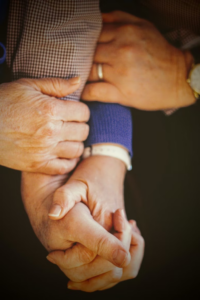For those supporting a loved one with an eating disorder, the road to recovery can be stressful, frightening, and at times, uncertain. Recovering from an eating disorder is no small task, and those that do have incredible strength. No matter how strong a person may be, we all need support, love, encouragement, and connection from our support system. If you find yourself a part of someone’s support system while they are recovering from an eating disorder, first- THANK YOU! Thank you for showing up for your loved one, caring and loving for them, even when it is challenging. Next, consider the following suggestions:
DO

- Validation! Validation! Validation! Learn to validate their feelings, fears, struggles without judgment or comparison. Check out our blog on validation for more information.
- Educate yourself on eating disorders. Check out the National Eating Disorder Association for helpful information.
- Support your loved one in finding professional treatment; may include a therapist, dietician, psychiatrist, and others. This blog provides more information about treatment teams.
- Have patience. Eating disorders are not developed overnight, nor will they be recovered overnight.
- Take care of your own needs even when supporting someone. If you have ever been on an airplane, they always tell you that in the event of an emergency, put your own oxygen mask on before attending to others. The same rule applies here! Consider receiving your own support whether through individual, couples, or family therapy, or support groups. This road is easy for no one.
DON’T
- Don’t blame yourself or your loved ones! Just as much as I encourage you to validate your loved ones, you also need to validate yourself and the rollercoaster of emotions you are feeling. Check out our blog on self-invalidation for ways to change this thinking.
- Don’t comment on food, nutritional facts, weight, or appearance in a judgmental tone. This is where family therapy can be really useful so you as a supporter have a place to discuss concerns you may have. If you have a concern, present it in a gentle tone, coming from a place of compassion and concern.
- Don’t focus on eating and recovery all day, every day. The urge to only focus on recovery is valid and strong; however, don’t forget to still incorporate fun, social activities with your loved one.
- Don’t be afraid to ask for help. Eating disorder recovery is a complex and sometimes scary journey. Don’t be afraid to ask help from others in supporting you and your loved one. Especially for parents, this could also look like taking your child to a doctor or therapy appointment if you have concerns about their eating.
- Don’t give up! Recovery is possible and there are endless resources available for supporting everyone on this journey. The NEDA website is a phenomenal resource for finding support.
 The road to recovery will be filled with ups and downs, bumps in the road, and setbacks. Regardless, this road is able to be walked on, especially with the support of others.
The road to recovery will be filled with ups and downs, bumps in the road, and setbacks. Regardless, this road is able to be walked on, especially with the support of others.
Recovery is possible!
Inspiration taken from the National Alliance for Eating Disorders.
Additional Resources:
The National Eating Disorders Association website has a lot of helpful tools on there; some highlights:
- Screening Tool– a short questionnaire you can fill out to guide your decision on whether or not to seek professional help
- Treatment Provider Database– ways to find providers around the country
- Warning Signs and Symptoms– a list of common signs and symptoms you or a loved one may be experiencing
If you or a loved one is struggling with an eating disorder, or you are supporting a loved one, Click here to schedule an initial appointment with one of our amazing clinicians.

